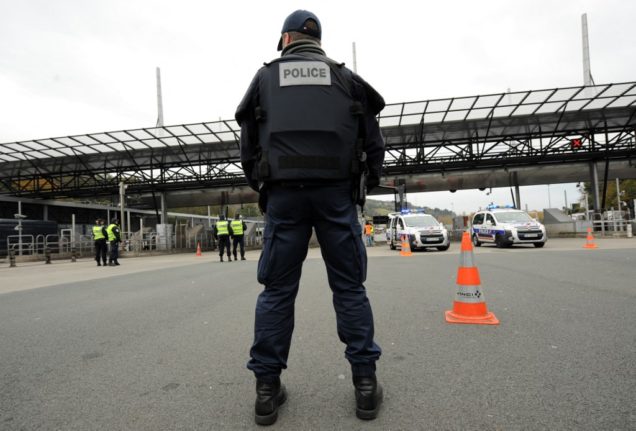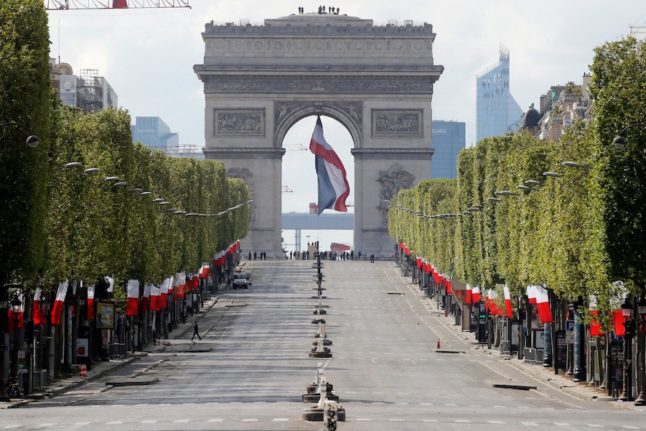France plans to use tablet computer devices to register non-EU car passengers at land and sea borders – including its border with the UK – when the new EU border system EES becomes operational next year, a new document has revealed.
In May 2023, countries of the Schengen area will introduce the new Entry & Exit System (EES) to record the entry and exit of non-EU citizens at their external borders. The EES was created to tighten up border security and will ensure the enforcement of the 90-day short-stay limit for tourists and visitors.
You can read full details of how the system will work HERE.
The system will enable the automatic scanning of passports replacing manual stamping by border guards. Data collected will include the person’s name, type of travel document, fingerprints and facial images, as well as the date and place of entry and exit. The information will be kept in a centralised database on a rolling three-year basis that will be re-set at each entry.
The system will come into effect around the EU, but there have been major concerns about the France-UK border due to both the high volume of traffic and the Le Touquet Treaty border arrangements that mean French officials work in British ports of Dover and Folkestone – both of which saw long queues this summer as travel resumed after the pandemic.
A document shared recently by the secretariat of the EU Council (the EU institution representing member states) and published by Statewatch, a non-profit organisation that monitors civil liberties, shows how countries are preparing.
In the responses to the EU questionnaire, French authorities vowed they would be ready, saying simply Oui, La France sera prête (yes, France will be ready).
“The French authorities have carried out numerous studies and analyses, in cooperation with infrastructure managers, to map passenger flows at each border crossing post… and evaluate the EES impact on waiting times,” the document says.
“France has prepared very actively and will be on schedule for an EES implementation in compliance with the EU regulation,” French authorities say.
Test runs of the new system will begin at French border posts at the end of this year, they added.
However despite the vow that the new system will be ready on time to deal with thousands of passengers each day authorities admitted “the prospect of the impact of EES on waiting times at the borders worries infrastructure managers.”
French authorities admitted they are concerned about queues and backlogs at border crossings.
“The fact remains that fluidity remains a concern, and that exchanges are continue with each border post manager to make progress on this point,” they told the EU.
This same concern was expressed by the CEO of the Port of Dover, Doug Bannister earlier this month when he told The Local he was concerned the time it takes to check each vehicle under EES could jump for around one and half minutes currently to 10 minutes.
Tablets to be used at land and sea borders
The way checks would be carried out for passengers at France’s sea borders with the UK has been a major concern especially at the Dover-Calais crossing, the busiest car route between the UK and continental Europe, with 8.6 million passengers passing through in 2019.
Bannister, told The Local that first-time registration at Dover was the most concerning part of the new process, as it would require taking four fingerprints and facial images “at the border in front of an immigration officer”.
Bannister said the current process was “designed around an airport” but this would not suit “a busy ferry terminal”. He demanded a system be introduced whereby registrations are carried out without passengers needing to leave the car.
French authorities’ response to the EU questionnaire has revealed they plan to use tablets, such as iPads to register car passengers’ details under EES.
The responses by French authorities to the EU questionnaire seem to clarify that agents will use tablets to register passengers directly in their cars under the “close supervision” of border guards, who will validate the biometric data on the spot.
France will set up “‘mobile’ registration solutions (tablets) to record the biographical and biometric data of travellers eligible for the EES directly on board vehicles,” the document revealed.
People getting off buses will instead be able to use self-service kiosks similar to those set up at airports.
Airports
For non-EU visitors arriving by plane, France will set up self-service kiosks “supervised remotely via video by a border guard”.
Here, third-country nationals will be able to pre-register their biometric data and personal information, and complete the entry questionnaire. They will then be directed to the booth for verification of the data with the border guard.
According to the document, France plans to maintain the eligibility for certain third-country nationals to go through automated ‘Parafe’ checks for subsequent entries and exits. E-gates are currently available for the citizens of Andorra, Monaco, San Marino, Australia, Canada, South Korea, Japan, New Zealand the United Kingdom and Singapore (as well as EU citizens).
Doubts on gradual introduction
To facilitate the process, the European Commission has proposed a ‘progressive approach’ that would allow the creation of “incomplete” passenger files for 9 months following the EES entry into operation, and continuing passport stamping for 3 months.
Dover had also favoured some kind of transition period to allow the port to get used to the new system. But the French appear to have rejected this idea.
They described the option of “progressive” introduction as “not satisfactory”, because it would require other adaptations of the system.
France has called for “flexibility” to mitigate the impact of EES in the first months of its entry into service. In particular, French authorities called for the possibility of not creating EES files for third-country nationals who entered the Schengen area before the system becomes operational, leaving this task to when they return later.
This would “significantly ease the pressure” on border guards “during the first three months after entry into service,” the document says.
Responding to the questions, French authorities also said they intend to seek the support of Frontex, the EU border agency, in a more general context than the the entry in operation of the EES, in view of the 2024 Olympics.
Non-EU residents in France
EES applies only to people entering the EU as tourists or making short visits – it does not apply to non-EU nationals who live in an EU country with a residency card such as a carte de séjour or a visa.
You can read full details on the system for residents HERE.







 Please whitelist us to continue reading.
Please whitelist us to continue reading.
Member comments